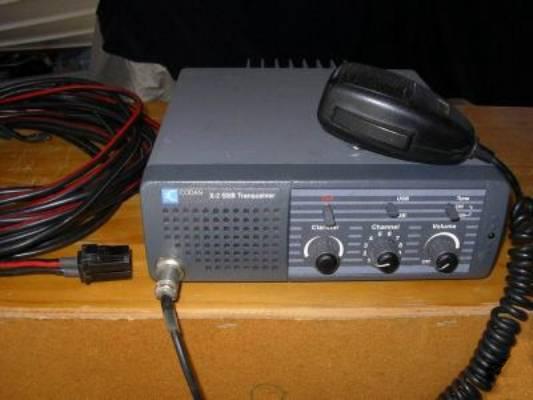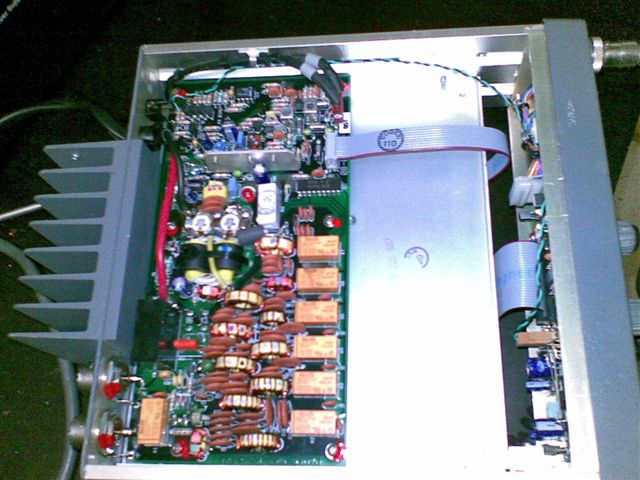
General
Specifications
Frequency
Range 2 to 18 MHz.
Channel
Capacity 10 channels. Any combination of single or dual
frequency
simplex.
Frequency
Generation Frequency synthesiser
with 10 Hz resolution:
controlled
by plug-in EEPROM.
Operating
Modes Single sideband (J3E).
Programmable
USB, LSB or front panel
switched.
Frequency
Stability USB: ±2(3)ppm
LSB:
±(2(3)ppm
+10 Hz) }-10°C to
+60°C
Long
term ageing 1ppm per year.
Crystal
reference oven warm up time 1 minute.
Programming
Frequencies and options are
programmed via the
microphone
socket and 3-wire RS232 interface
using
XP programming software and an IBM
compatible
PC.
Cloning
Channel frequencies and options can
be copied
from
one transceiver to another via the
microphone
socket.
Controls
Power ON/OFF and Volume.
Channel
select.
Clarifier.
Mode
USB/LSB.
Mute
ON/OFF/Tune.
Emergency
Call: RFDS 880/1320 Hz. (Australia
only)
Indicators
Power On/Transmit.
Connectors:
Front
Rear
Microphone/Handset.
RF
- UHF connectors: Qty 2 (programmable).
Antenna
Control.
Extension
Loudspeaker.
RF
Input/Output
impedance
50
W nominal.
Supply
Voltage 12 V DC nominal, negative
earth.
Normal
operating range 10.5 to 15 V.
Maximum
operating range 9 to 16 V approx.
Reverse
polarity protection.
Supply
Current Receive : no signal 360 mA.
Transmit:
refer to Transmit Specifications.
Environment
Ambient Temp.
-10°C to
+30°C
+30°C to
+60°C
Relative
Humidity
95%
From
95% at +30°C to
30%
at +60°C
Derate
upper ambient temperature by 1°C
per
330
m above sea level.
Cooling
Convection.
Size
and Weight Transceiver only:
230
mm W x 75 mm H x 290 mm D 2.5 kg
With
mounting cradle:
250
mm W x 90 mm H x 290 mm D 3.0 kg
Depth
measurements include rear
connectors/cables.

Receiver
Specifications
Type
Dual conversion, superheterodyne.
IF
Frequencies 45 MHz and 455 kHz.
Sensitivity
0.3(0.4) mV PD -117(-115) dBm for 10 dB
SINAD
with > 50 mW audio output.
Input
Protection Will withstand 50 V RF from 50 W.
Selectivity
Greater than 70(65) dB at -1 kHz and
+4 kHz
reference
SCF USB.
Pass
Band -6(-8) dB 300 to 2700 Hz
Ripple
2(4) dB pp 500 to 2500 Hz
Desensitisation
10 dB SINAD reduced to 7 dB SINAD.
-1
and +4 kHz (ref SCF) 65(60) dB
±10
kHz 85(80) dB
±50
kHz 100(95) dB
Image
Rejection Better than 90(80) dB.
Spurious
Responses Better than 90(70) dB.
Self
Generated Signals > 0.3 mV
PD:
3652,
5478, 7304, 9130, 10956, 14608 kHz.
Cross
Modulation A signal 85(80) dB above a signal producing
10
dB SINAD, modulated 30% and removed at
least
20 kHz from the wanted signal will
produce
an increase in receiver noise of less than
3
dB.
Blocking
As for desensitisation.
Intermodulation
To produce a third order intermodulation
product
equivalent to a wanted signal producing
10
dB SINAD, two unwanted signals greater
than
30 kHz removed from the wanted signal
must
have a level greater than 82(80) dB above
the
wanted signal. Third order intercept +7(4)
dBm,
not affected by AGC.
AGC
Less than 6 dB variation in output
for input
variation
between 1.5(2.5) mV
and 100 mV PD.
Fast
attack, slow release.
AF
Power and
Distortion
2.5
W into 8 W 5% THD
5.0
W into 4 W 5% THD
8.0
W into 2 W 5% THD.
Clarifier
±50 Hz up to 5 MHz
±10
ppm above 5 MHz
Clarifier
is automatically reset to mid-frequency
with
channel change.

PA Board-Thanks to Stuart Blackshaw
Transmitter
Specifications
Type
All solid state.
Power
Output 100 W PEP ± 0.5 dB may be internally set to
any
output between 125 and 25 W PEP.
CW
or single tone approx. 60% of PEP.
(Average
ALC control).
Duty
Cycle 100% normal speech.
Supply
Current 2-tone/CW 8 to 12 A
Average
speech 6 A
Average
speech for battery life calculations.
Protection
Safe under all load conditions by
limiting
reflected
power to 10 W PEP and limiting PA
transistor
collector voltage swing.
Thermal
protection against excessive heatsink
temperature.
AF
Response Overall response of
microphone and transmitter
rises
approximately 6 dB/octave 300-2700 Hz.
Electrical
input -6(8) dB, 300-2700 Hz.
Ripple
2(4) dB pp, 500-2500 Hz.
Spurious
and
Harmonic
Emissions
55(48)
dB below PEP.
Carrier
Suppression 60(50) dB below PEP.
Unwanted
Sideband 50(45) dB below PEP (400 Hz).
70(65)
dB below PEP (1 kHz).
Intermodulation
(2
tone test)
100
W 30(26) dB below each tone.
36(32)
dB below PEP.
125
W 27(26) dB below each tone.
33(32)
dB below PEP.
ALC
A 10 dB increase in signal input
above
compression
threshold produces less than 0.5 dB
increase
in power output.
Maximum
ALC range greater than 30 dB.
ALC
attack time approximately 1 ms.
Residual
Noise 65(55) dB below PEP of
selected channel.
Microphone
Dynamic type with push-to-talk
switch fitted in
the case.

Processor/IF Board- Thanks to Stuart Blackshaw